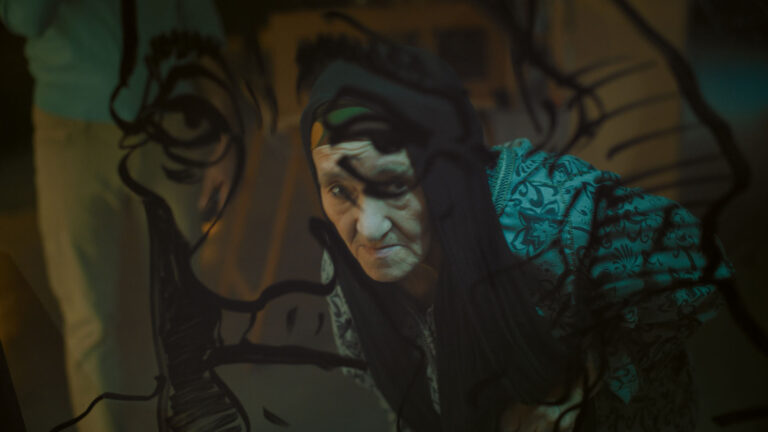The Mother of All Lies (2023 | Morocco | 96 minutes | Asmae El Moudir)
Often, documentaries rely on animation as a crutch when coverage is missing or archival footage impossible to obtain. It can be an easy way to provide a change of scenery while explaining a concept or a way of filling in blank spaces when a re-creation is too complicated to engineer. You can see why so many documentarians do it, but it’s almost become a trope. However, what Asmae El Moudir does in her Casablanca-set memory piece inverts that model to incredible success.
Rather than taking the audience out of the action with recreations, she instead employs the use of meticulously handcrafted dioramas that pull both viewers and her subjects into the story in a manner rarely seen in documentary. For a story seeking to understand her own family — especially her dictatorial grandmother — she worked with her father to create intricate cardboard representations of her childhood home and neighborhood along with plaster doll-like representation of its various characters. From its impressive detailing of rooms, streets, and public spaces to the hair and costumes of the rustic dolls, the project is one of outstanding scope and collective beauty.
All of this art, though, is in service of answering painfully difficult questions. Why did her grandmother forbid all photography? (The film opens with an interlude on memory, with the director detailing a renegade night at a photo studio on a night when all were engaged in a collective holiday of forgiveness.) More importantly, what happened to her family and their neighborhood more than a decade before El Moudir’s birth to install this regime of supreme control by this one menacing matriarch? And why has everyone put up with it for all these years?
Having installed the complex dioramas in a Marrakech studio, El Moudir entices her family to visit. Even the grandmother, resistant to the entire project or to taking anyone else’s direction, can’t help but attend out of an overwhelming a mix of curiosity and an ingrained need for control over her family’s activities and image. She’s a perpetual scold, glaring from the corners of shots and criticizing everything including her own representations. Even with her and her objections, the space becomes a sometimes collaborative and occasionally adversarial laboratory of memory.
With families and neighbors gathered in one space El Moudir trains her camera on their efforts to understand a complex family history and expose long-suppressed atrocities whose horrors ripple into the present day. It unravels scarring personal experiences and horrifying state-sponsored violence while providing a kind of therapeutic sharing of information and feelings. Although it may leave some impossible questions unanswered, the introspective journey is less interested on the external factors that scarred a neighborhood than the internal landscape left behind. It’s a difficult but beguiling approach whose decades in the making resulted in a truly unique form of storytelling.
The Mother of All Lies played as an official selection of the Spotlight program at the 2024 Sundance Film Festival.
Image courtesy of Sundance Institute | photo by Insightfilms.



